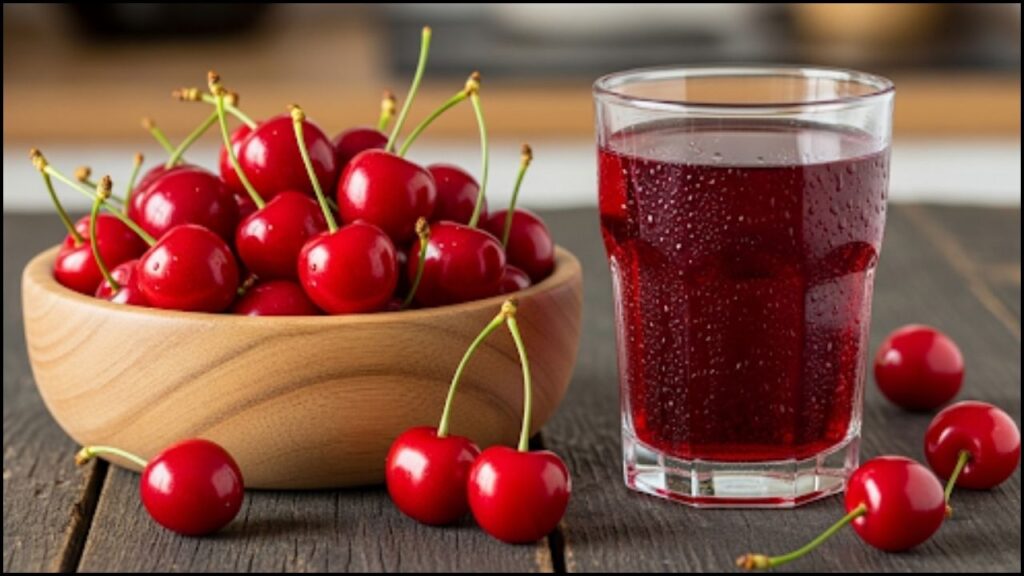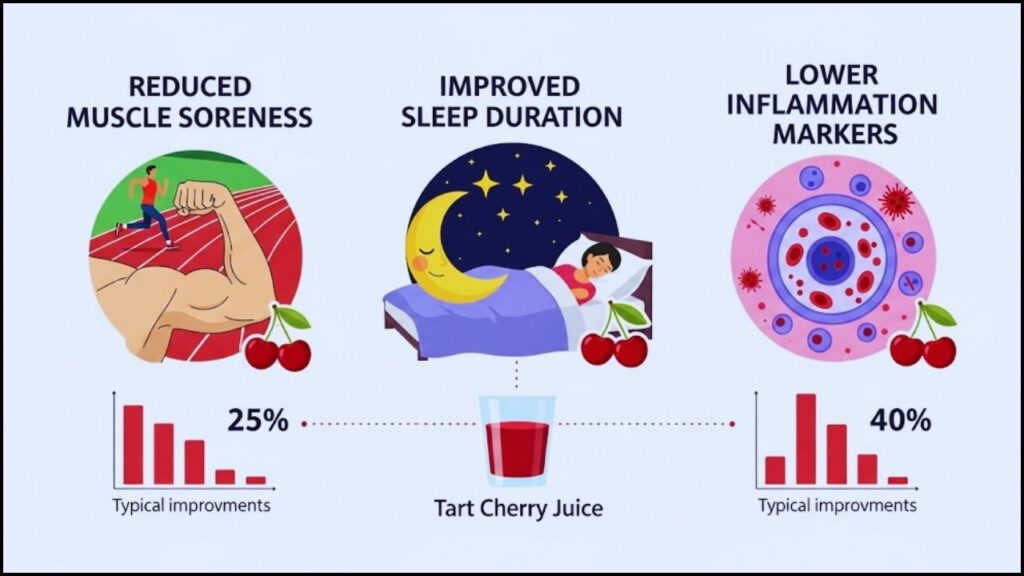
An increasing number of studies are lending scientific weight to the health claims surrounding tart cherry juice, a beverage once relegated to niche health food aisles. From elite athletes seeking faster muscle recovery to individuals struggling with sleep, the potential tart cherry juice benefits are drawing mainstream attention, driven by evidence pointing to its potent anti-inflammatory and antioxidant properties.
The primary focus of the research has been on the Montmorency tart cherry, a variety particularly rich in anthocyanins. These are flavonoid compounds that give the fruit its deep red color and are believed to be responsible for many of its health-promoting effects. While not a panacea, researchers say the juice shows significant promise as a functional food.
Tart Cherry Juice Benefits
| Key Benefit | Scientific Detail |
| Enhanced Muscle Recovery | Studies show it may reduce muscle pain, soreness, and strength loss after strenuous aerobic and resistance exercise. |
| Improved Sleep Quality | Contains natural melatonin and tryptophan, which research suggests may increase sleep time and efficiency. |
| Reduced Inflammation | High antioxidant levels may help lower key inflammatory markers linked to chronic diseases like arthritis. |
The Science Behind Better Muscle Recovery
For athletes, one of the most compelling tart cherry juice benefits is its role in mitigating exercise-induced muscle damage. Strenuous physical activity causes microscopic tears in muscle fibers, leading to inflammation, oxidative stress, and the familiar sensation of delayed onset muscle soreness (DOMS).
“The anthocyanins in tart cherries appear to act in a similar way to some non-steroidal anti-inflammatory drugs (NSAIDs),” explained Dr. Malachy McHugh, Director of Research at the Nicholas Institute of Sports Medicine and Athletic Trauma. In a foundational study he co-authored, runners who drank tart cherry juice before and after a long-distance race experienced significantly less pain compared to a placebo group.
Subsequent research has supported these findings. A 2021 meta-analysis published in the Journal of the International Society of Sports Nutrition concluded that tart cherry supplementation improves endurance exercise performance by reducing muscle soreness, inflammation, and oxidative stress, thereby accelerating recovery.

A Natural Aid to Improve Sleep
Beyond the gym, tart cherry juice is gaining recognition for its potential to improve sleep. Tart cherries are one of the few natural food sources of melatonin, a hormone the brain produces in response to darkness that helps regulate the body’s sleep-wake cycle. A study published in the European Journal of Nutrition found that adults who drank tart cherry juice concentrate for seven days saw increases in their sleep time and sleep efficiency.
“It’s not just the melatonin,” said Dr. Darryn S. Willoughby, a professor of Health, Human Performance, and Recreation at Baylor University. “Tart cherries also contain a decent amount of tryptophan, an essential amino acid that is a precursor to serotonin, which itself is converted to melatonin. This synergistic effect may be what makes it effective.” Experts caution, however, that it is a mild aid and not a treatment for chronic insomnia, for which medical consultation is recommended.
Potent Anti-inflammatory Effects
The same compounds that help muscles recover also position tart cherry juice as a powerful anti-inflammatory agent. Chronic inflammation is a root cause of many major diseases, including heart disease, diabetes, and arthritis. Several studies have focused on its effect on osteoarthritis, a degenerative joint disease. Research from a study presented at the American College of Sports Medicine (ACSM) conference found that subjects who consumed tart cherry juice daily for six weeks experienced a significant reduction in serum biomarkers of inflammation, such as C-reactive protein (CRP).
Furthermore, a study in the journal Osteoarthritis and Cartilage reported that patients with knee osteoarthritis who drank the juice for six weeks saw a significant improvement in pain and function scores compared to a placebo.
Dosage, Forms, and Considerations
For those looking to incorporate it into their diet, understanding dosage and form is critical. Most studies use a daily intake of either 8 to 12 ounces (240-360 mL) of juice or 1 to 2 tablespoons of a more potent concentrate.
Consumers should read labels carefully. Nutrition experts advise choosing 100% tart cherry juice with no added sugars, as high-sugar beverages can counteract the anti-inflammatory benefits. The juice is naturally high in sorbitol, a sugar alcohol that can cause digestive discomfort in some individuals when consumed in large quantities.
While the body of evidence is growing, researchers agree that more large-scale, long-term human trials are needed to solidify these findings and explore other potential benefits, such as improved cardiovascular health and cognitive function. For now, the existing research suggests that for many, adding a glass of tart cherry juice to their routine may be a simple, effective strategy for supporting recovery and overall wellness.
Pickle Lemonade’s Viral Rise: Culinary Editors and Health Experts Weigh In
